译林版(2020) 必修第三册 Unit 4 Scientists Who Changed the World Grammar and usage 课件(58张)
文档属性
| 名称 | 译林版(2020) 必修第三册 Unit 4 Scientists Who Changed the World Grammar and usage 课件(58张) |
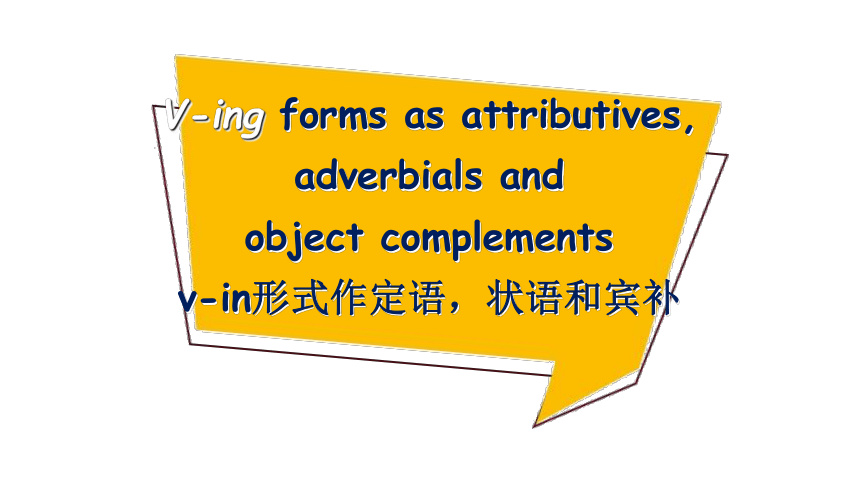
|
|
| 格式 | pptx | ||
| 文件大小 | 1.8MB | ||
| 资源类型 | 教案 | ||
| 版本资源 | 牛津译林版(2019) | ||
| 科目 | 英语 | ||
| 更新时间 | 2022-09-21 11:59:54 | ||
图片预览

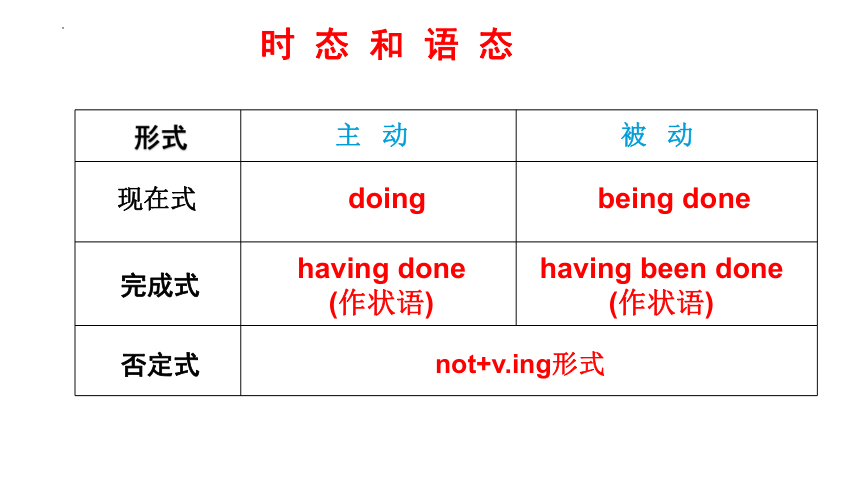
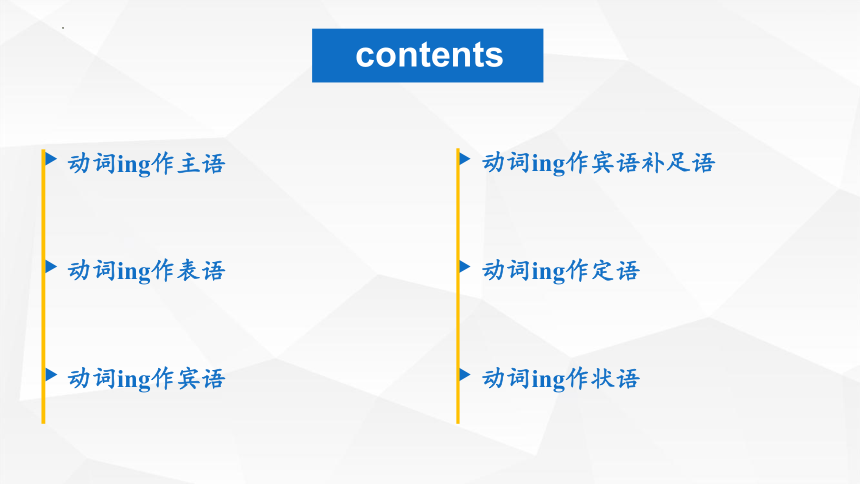


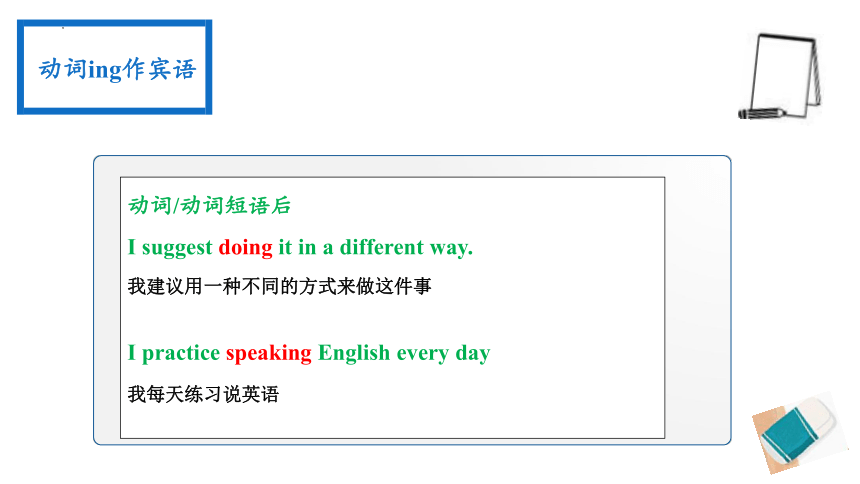
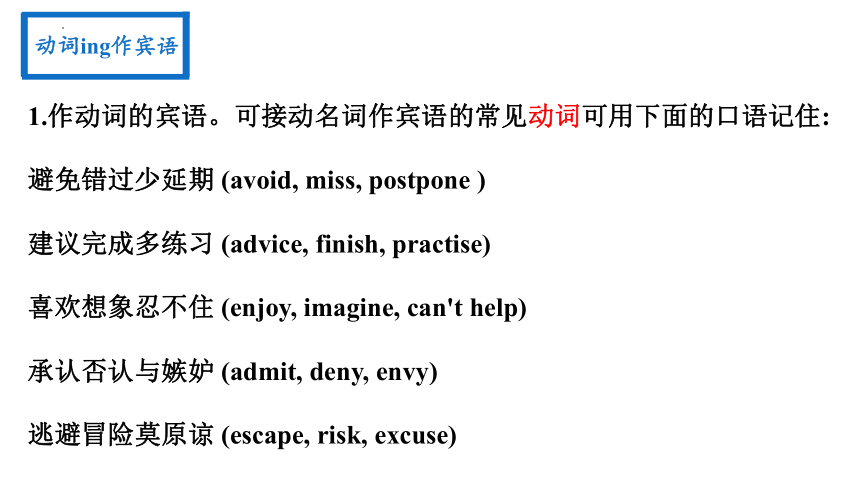

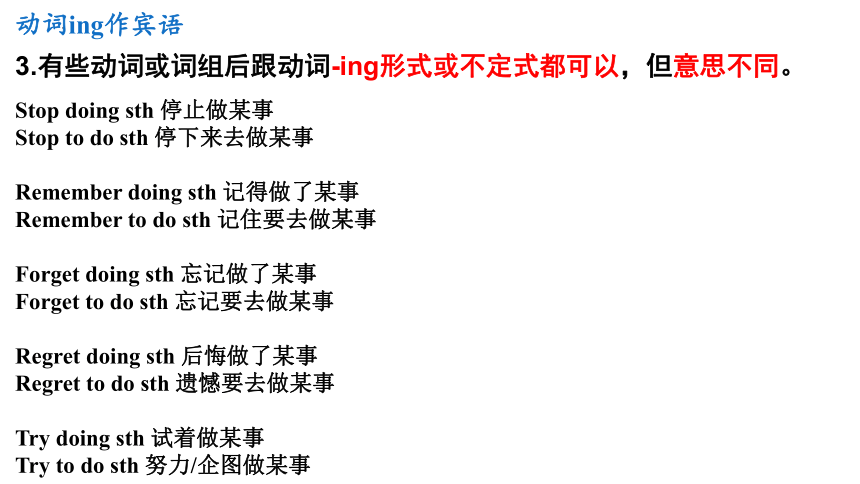
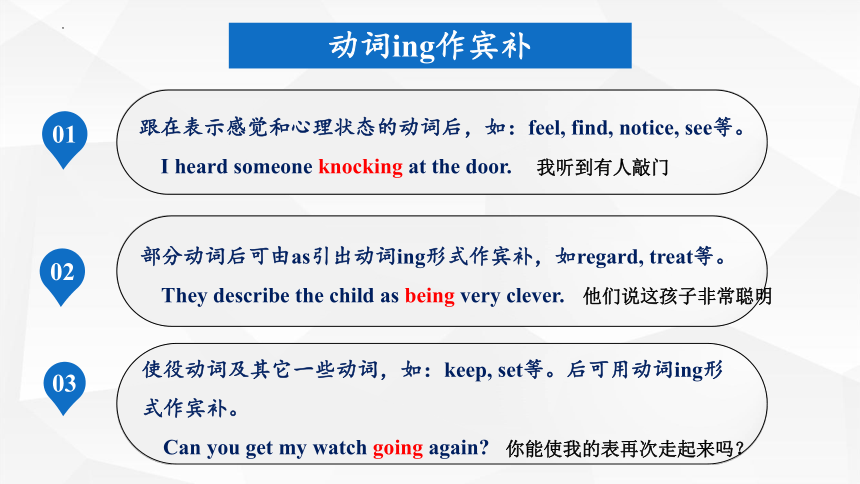
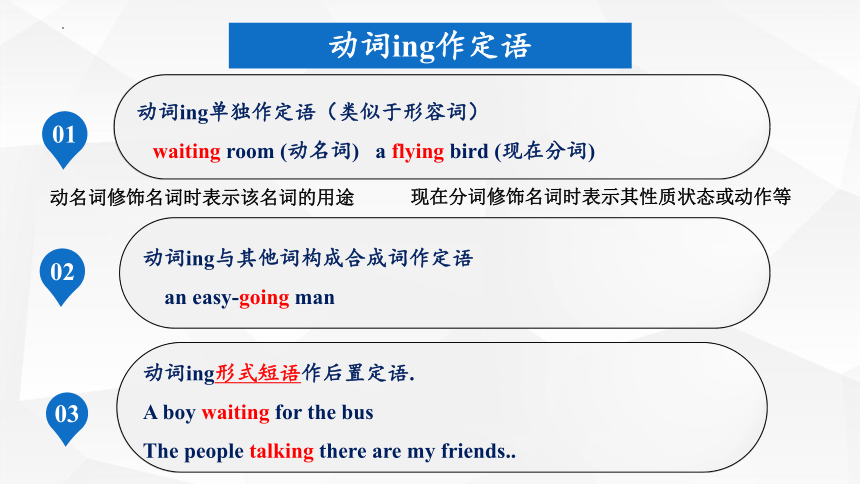
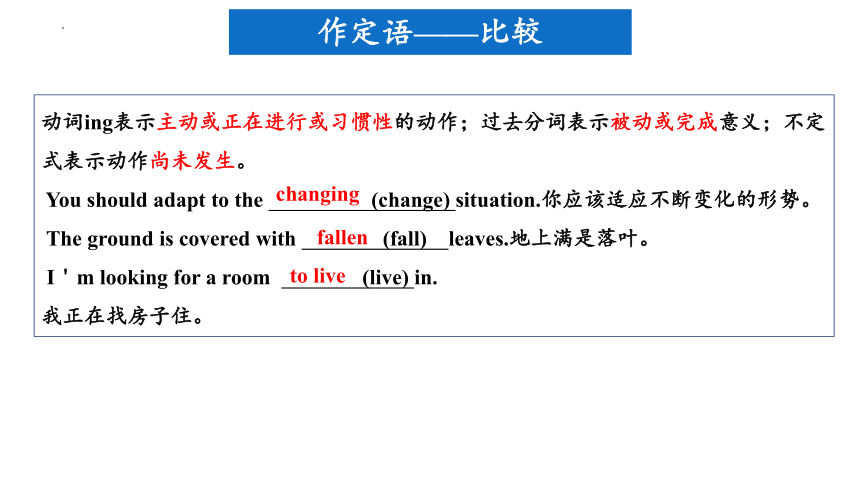
文档简介
(共57张PPT)
V-ing forms as attributives,
adverbials and
object complements
v-in形式作定语,状语和宾补
时 态 和 语 态
doing
being done
having done (作状语)
having been done (作状语)
not+v.ing形式
形式
现在式
完成式
否定式
主 动
被 动
contents
动词ing作主语
动词ing作表语
动词ing作宾语
动词ing作宾语补足语
动词ing作定语
动词ing作状语
动词ing作主语
A
A. 一般形式
Coming to Hangzhou by train takes about 3 hours.
B. it 作形式主语
It is no use arguing with him.
C. There be 句式
There is no harm in doing so.
这样做没有害处
动词ing作表语
A
A. 动名词(相当于名词)
My favorite sport is swimming.
Their job is cleaning the window.
B. 现在分词(相当于形容词)
The food smells inviting.
The reason he gave was very convincing.
这食物闻起来很诱人。
他给的理由非常令人信服
A
动词/动词短语后
I suggest doing it in a different way.
I practice speaking English every day
我建议用一种不同的方式来做这件事
动词ing作宾语
我每天练习说英语
1.作动词的宾语。可接动名词作宾语的常见动词可用下面的口语记住:
避免错过少延期 (avoid, miss, postpone )
建议完成多练习 (advice, finish, practise)
喜欢想象忍不住 (enjoy, imagine, can't help)
承认否认与嫉妒 (admit, deny, envy)
逃避冒险莫原谅 (escape, risk, excuse)
动词ing作宾语
2.英语中有一些动词短语也常跟 v-ing 形式作宾语。常见的跟v-ing 形式作宾语的动词短语有 insist on, object to, be good at, lead to, put off, give up, look forward to, feel like, devote to, get used to, pay attention to, be worth, be busy 等。
动词ing作宾语
He insisted on doing it in his own way.
他坚持要按自己的方法去做。
I have never dreamed of visiting that place.
我从未梦想过要参观那个地方。
Stop doing sth 停止做某事
Stop to do sth 停下来去做某事
Remember doing sth 记得做了某事
Remember to do sth 记住要去做某事
Forget doing sth 忘记做了某事
Forget to do sth 忘记要去做某事
Regret doing sth 后悔做了某事
Regret to do sth 遗憾要去做某事
Try doing sth 试着做某事
Try to do sth 努力/企图做某事
动词ing作宾语
3.有些动词或词组后跟动词-ing形式或不定式都可以,但意思不同。
动词ing作宾补
01
跟在表示感觉和心理状态的动词后,如:feel, find, notice, see等。
I heard someone knocking at the door.
02
部分动词后可由as引出动词ing形式作宾补,如regard, treat等。
They describe the child as being very clever.
使役动词及其它一些动词,如:keep, set等。后可用动词ing形式作宾补。
Can you get my watch going again
03
你能使我的表再次走起来吗?
他们说这孩子非常聪明
我听到有人敲门
动词ing作定语
01
动词ing单独作定语(类似于形容词)
waiting room (动名词) a flying bird (现在分词)
02
动词ing与其他词构成合成词作定语
an easy-going man
动词ing形式短语作后置定语.
A boy waiting for the bus
The people talking there are my friends..
03
动名词修饰名词时表示该名词的用途
现在分词修饰名词时表示其性质状态或动作等
作定语——比较
动词ing表示主动或正在进行或习惯性的动作;过去分词表示被动或完成意义;不定式表示动作尚未发生。
You should adapt to the (change) situation.你应该适应不断变化的形势。
The ground is covered with (fall) leaves.地上满是落叶。
I'm looking for a room (live) in.
我正在找房子住。
changing
to live
fallen
动词ing作状语
01
02
作时间状语
Hearing the noise, I turned round
=When I heard the noise, I turned round.
作原因状语
Being poor, he could't afford a TV set.
=Because he was poor, he couldn't afford a TV set.
听到响声我转过身去。
由于贫穷,他买不起电视机。
动词ing作状语
03
04
作条件状语
相当于一个if引导的条件状语从句。
Working hard, you'll certainly succeed.
=If you work hard, you'll certainly succeed.
作结果状语
通常放在句末,中间用逗号隔开,表示一种顺其自然、意料之中的结果。
The fire lasted whole night, causing great damage.
只要努力学习, 你肯定会成功的。
大火持续了一整夜, 造成了巨大损失。
动词ing作状语
[名师点津]动词-ing形式作结果状语,是随着谓语动词的发生而产生的自然结果,其逻辑主语往往是前面整个句子所描述的情况,前面有时候可以加thus而不定式作结果状语时常表示出乎意料的结果,常用 only to do结构,其被动形式为 only to be done
He was caught in the rain,thus making himself catch a cold.
I hurried to school,only to find it was Sunday.
被雨淋后他感冒了。
我匆忙赶到学校,结果发现是星期天。
动词ing作状语
06
作让步状语
相当于although/though引导的让步状语从句
Having being told many times, he still repeated the same mistake.
= Although he had been told many times, he still repeated the same mistake.
虽然被告知多次了,但他仍然犯同样的错误。
动词ing作状语
05
作伴随状语
动词-ing表示的动作和主句的动作同时发生,此时它可转换成由
连词连接的并列谓语。
Mary sat by the window of the classroom, reading book.
=Mary sat by the window of the classroom and was reading a book.
玛丽坐在教室的窗边读书。
Focus on
基本用法
V–ing forms as attributives
v-ing 作定语
building materials =
drinking water =
a walking stick =
a reading room =
a writing desk =
tiring music =
materials for building 建筑材料
water for drinking 饮用水
a stick for walking 手杖
a room for reading 阅览室
a desk for writing 写字台
music that is tiring 烦人的音乐
1. 单个动词-ing形式作定语,常置于被修饰词之前,可表示被修饰者的作用或功能
① The experiment was an amazing success.
② It was an astonishing performance.
那项试验是一个惊人的成功。
这是一场令人惊讶的演出。
有些动词-ing形式已转化成形容词,表示“令人……的”。常用的此类词有:exciting, amazing, astonishing, shocking, puzzling, confusing, disappointing, discouraging, pleasing, striking, boring, tiring, touching, moving, interesting, satisfying, terrifying, frightening等。
① They lived in a room facing the street.
② The man standing there is Peter's father.
③ Anybody swimming in this river will be fined.
= They lived in a room that faces the street.
他们住在一间面朝街的房子。
= The man who is standing there is Peter's father.
站在那儿的那个人是彼得的父亲。
= Anybody who is swimming in this river will be fined.
在这条河里游泳的任何一个人都会被罚款。
2. (1) 动词-ing形式短语作定语,常置于被修饰词之后,并且在意思上相当于一个定语从句。
① His brother, working as a teacher, lives in Beijing.
② The apple tree, swaying gently in the breeze, had a good crop of fruit.
= His brother, who is working as a teacher, lives in Beijing.
他的哥哥住在北京,是个教师。
= The apple tree, which was swaying gently in the breeze, had a good crop of fruit.
那棵苹果树硕果累累,在微风中轻轻摇曳。
2. (2)动词-ing形式短语也可以用作非限制定语,相当于一个非限制性定语从句,这时,它与句子其他部分用逗号分开。
3. 动词-ing形式作定语,有被动形式。
动词-ing形式与被修饰词是被动关系,就用它的被动形式,即being done. Being done通常表示正在被做,常做后置定语。
① The tall building being built now is our new school.
② The question being discussed was presented by the
headmaster.
正在被建的高楼是我们的新学校。
正在被讨论的问题是被校长提出的。
Fill in the blanks.
1. He rushed into the ________ (burn) house.
2. The child _________ (stand) over there is my brother.
3. The room _________ (face) south is our classroom.
4. The man, ________ (talk) to the teacher, is our monitor's father.
5. Success makes sense to you only when you choose something ___________ (challenge).
burning
challenging
standing
facing
talking
Focus on
基本用法
V–ing forms as adverbials
v-ing 作状语
1. Walking in the street, I saw a tailor's shop.
2. Being poor, he couldn't afford a TV set.
3. His father died, leaving the family even worse off.
4. Using your head, you will find a good way.
5. Studying hard, he didn't pass the exam.
6. He earns a living driving a truck.
7. He sat in the chair reading a newspaper.
动词-ing形式可以表示时间、原因、结果、条件、让步、方式或伴随状况等,其作用相当于状语从句或并列句。
1. Walking in the street, I saw a tailor's shop.
2. Being poor, he couldn't afford a TV set.
3. His father died, leaving the family even worse off.
4. Using your head, you will find a good way.
5. Studying hard, he didn't pass the exam.
6. He earns a living driving a truck.
7. He sat in the chair reading a newspaper.
时间
动词-ing形式可以表示时间、原因、结果、条件、让步、方式或伴随状况等,其作用相当于状语从句或并列句。
1. Walking in the street, I saw a tailor's shop.
2. Being poor, he couldn't afford a TV set.
3. His father died, leaving the family even worse off.
4. Using your head, you will find a good way.
5. Studying hard, he didn't pass the exam.
6. He earns a living driving a truck.
7. He sat in the chair reading a newspaper.
时间
动词-ing形式可以表示时间、原因、结果、条件、让步、方式或伴随状况等,其作用相当于状语从句或并列句。
1. When I walked in the street, I saw a tailor's shop.
1. Walking in the street, I saw a tailor's shop.
2. Being poor, he couldn't afford a TV set.
3. His father died, leaving the family even worse off.
4. Using your head, you will find a good way.
5. Studying hard, he didn't pass the exam.
6. He earns a living driving a truck.
7. He sat in the chair reading a newspaper.
时间
原因
动词-ing形式可以表示时间、原因、结果、条件、让步、方式或伴随状况等,其作用相当于状语从句或并列句。
1. When I walked in the street, I saw a tailor's shop.
1. Walking in the street, I saw a tailor's shop.
2. Being poor, he couldn't afford a TV set.
3. His father died, leaving the family even worse off.
4. Using your head, you will find a good way.
5. Studying hard, he didn't pass the exam.
6. He earns a living driving a truck.
7. He sat in the chair reading a newspaper.
时间
原因
动词-ing形式可以表示时间、原因、结果、条件、让步、方式或伴随状况等,其作用相当于状语从句或并列句。
1. When I walked in the street, I saw a tailor's shop.
2. Because he was poor, he couldn't afford a TV set.
1. Walking in the street, I saw a tailor's shop.
2. Being poor, he couldn't afford a TV set.
3. His father died, leaving the family even worse off.
4. Using your head, you will find a good way.
5. Studying hard, he didn't pass the exam.
6. He earns a living driving a truck.
7. He sat in the chair reading a newspaper.
时间
原因
结果
动词-ing形式可以表示时间、原因、结果、条件、让步、方式或伴随状况等,其作用相当于状语从句或并列句。
1. When I walked in the street, I saw a tailor's shop.
2. Because he was poor, he couldn't afford a TV set.
1. Walking in the street, I saw a tailor's shop.
2. Being poor, he couldn't afford a TV set.
3. His father died, leaving the family even worse off.
4. Using your head, you will find a good way.
5. Studying hard, he didn't pass the exam.
6. He earns a living driving a truck.
7. He sat in the chair reading a newspaper.
时间
原因
结果
动词-ing形式可以表示时间、原因、结果、条件、让步、方式或伴随状况等,其作用相当于状语从句或并列句。
1. When I walked in the street, I saw a tailor's shop.
2. Because he was poor, he couldn't afford a TV set.
3. His father died and left the family even worse off.
1. Walking in the street, I saw a tailor's shop.
2. Being poor, he couldn't afford a TV set.
3. His father died, leaving the family even worse off.
4. Using your head, you will find a good way.
5. Studying hard, he didn't pass the exam.
6. He earns a living driving a truck.
7. He sat in the chair reading a newspaper.
时间
原因
结果
条件
动词-ing形式可以表示时间、原因、结果、条件、让步、方式或伴随状况等,其作用相当于状语从句或并列句。
1. When I walked in the street, I saw a tailor's shop.
2. Because he was poor, he couldn't afford a TV set.
3. His father died and left the family even worse off.
1. Walking in the street, I saw a tailor's shop.
2. Being poor, he couldn't afford a TV set.
3. His father died, leaving the family even worse off.
4. Using your head, you will find a good way.
5. Studying hard, he didn't pass the exam.
6. He earns a living driving a truck.
7. He sat in the chair reading a newspaper.
时间
原因
结果
条件
动词-ing形式可以表示时间、原因、结果、条件、让步、方式或伴随状况等,其作用相当于状语从句或并列句。
1. When I walked in the street, I saw a tailor's shop.
2. Because he was poor, he couldn't afford a TV set.
3. His father died and left the family even worse off.
4. If you use your head, you will find a good way.
1. Walking in the street, I saw a tailor's shop.
2. Being poor, he couldn't afford a TV set.
3. His father died, leaving the family even worse off.
4. Using your head, you will find a good way.
5. Studying hard, he didn't pass the exam.
6. He earns a living driving a truck.
7. He sat in the chair reading a newspaper.
时间
原因
结果
条件
让步
动词-ing形式可以表示时间、原因、结果、条件、让步、方式或伴随状况等,其作用相当于状语从句或并列句。
1. When I walked in the street, I saw a tailor's shop.
2. Because he was poor, he couldn't afford a TV set.
3. His father died and left the family even worse off.
4. If you use your head, you will find a good way.
1. Walking in the street, I saw a tailor's shop.
2. Being poor, he couldn't afford a TV set.
3. His father died, leaving the family even worse off.
4. Using your head, you will find a good way.
5. Studying hard, he didn't pass the exam.
6. He earns a living driving a truck.
7. He sat in the chair reading a newspaper.
时间
原因
结果
条件
让步
动词-ing形式可以表示时间、原因、结果、条件、让步、方式或伴随状况等,其作用相当于状语从句或并列句。
1. When I walked in the street, I saw a tailor's shop.
2. Because he was poor, he couldn't afford a TV set.
3. His father died and left the family even worse off.
5. Though he studied hard, he didn't pass the exam.
4. If you use your head, you will find a good way.
1. Walking in the street, I saw a tailor's shop.
2. Being poor, he couldn't afford a TV set.
3. His father died, leaving the family even worse off.
4. Using your head, you will find a good way.
5. Studying hard, he didn't pass the exam.
6. He earns a living driving a truck.
7. He sat in the chair reading a newspaper.
时间
原因
结果
条件
让步
方式
动词-ing形式可以表示时间、原因、结果、条件、让步、方式或伴随状况等,其作用相当于状语从句或并列句。
1. When I walked in the street, I saw a tailor's shop.
2. Because he was poor, he couldn't afford a TV set.
3. His father died and left the family even worse off.
5. Though he studied hard, he didn't pass the exam.
4. If you use your head, you will find a good way.
1. Walking in the street, I saw a tailor's shop.
2. Being poor, he couldn't afford a TV set.
3. His father died, leaving the family even worse off.
4. Using your head, you will find a good way.
5. Studying hard, he didn't pass the exam.
6. He earns a living driving a truck.
7. He sat in the chair reading a newspaper.
时间
原因
结果
条件
让步
方式
动词-ing形式可以表示时间、原因、结果、条件、让步、方式或伴随状况等,其作用相当于状语从句或并列句。
1. When I walked in the street, I saw a tailor's shop.
2. Because he was poor, he couldn't afford a TV set.
3. His father died and left the family even worse off.
5. Though he studied hard, he didn't pass the exam.
4. If you use your head, you will find a good way.
6. He earns a living by driving a truck.
1. Walking in the street, I saw a tailor's shop.
2. Being poor, he couldn't afford a TV set.
3. His father died, leaving the family even worse off.
4. Using your head, you will find a good way.
5. Studying hard, he didn't pass the exam.
6. He earns a living driving a truck.
7. He sat in the chair reading a newspaper.
时间
原因
结果
条件
让步
方式
伴随
动词-ing形式可以表示时间、原因、结果、条件、让步、方式或伴随状况等,其作用相当于状语从句或并列句。
1. When I walked in the street, I saw a tailor's shop.
2. Because he was poor, he couldn't afford a TV set.
3. His father died and left the family even worse off.
5. Though he studied hard, he didn't pass the exam.
4. If you use your head, you will find a good way.
6. He earns a living by driving a truck.
1. Walking in the street, I saw a tailor's shop.
2. Being poor, he couldn't afford a TV set.
3. His father died, leaving the family even worse off.
4. Using your head, you will find a good way.
5. Studying hard, he didn't pass the exam.
6. He earns a living driving a truck.
7. He sat in the chair reading a newspaper.
时间
原因
结果
条件
让步
方式
伴随
动词-ing形式可以表示时间、原因、结果、条件、让步、方式或伴随状况等,其作用相当于状语从句或并列句。
1. When I walked in the street, I saw a tailor's shop.
2. Because he was poor, he couldn't afford a TV set.
3. His father died and left the family even worse off.
5. Though he studied hard, he didn't pass the exam.
4. If you use your head, you will find a good way.
7. He sat in the chair and read a newspaper.
6. He earns a living by driving a truck.
动词-ing形式用作状语时,其逻辑主语与句子主语一致。
Check the sentences.
Being tired, I asked John to have a rest.
Being tired, John had a rest.
1. Supposing it rains, we will put off the sports meeting.
2. Generally speaking, boys are more interested in science than girls.
如果下雨,我们就推迟运动会。
一般来说,男孩比女孩对科学更感兴趣。
动词-ing用于某些固定搭配中,
表示说话人的态度、观点等,如:generally speaking, frankly/honestly speaking, judging by/from, considering/seeing, supposing等等
Focus on
基本用法
V–ing forms as object
complements
v-ing 作宾补
1. I found a bag lying on the ground.
2. When we returned to the school, we found a stranger standing at the entrance.
3. Along the way, we saw many people playing music, singing, and dancing.
4. She heard someone knocking at the door.
1. I found a bag lying on the ground.
2. When we returned to the school, we found a stranger standing at the entrance.
3. Along the way, we saw many people playing music, singing, and dancing.
4. She heard someone knocking at the door.
1. 动词-ing形式作宾语补足语常放在宾语后面,表示一个正在进行的主动性的动作,强调一个过程或一种状态。
1. They found a dog sleeping on the street.
2. They heard him singing in next room.
3. We mustn't keep them waiting.
2. 当主句转换为被动结构时,原来作宾语补足语的动词-ing形式便转换为主语补足语。
= The dog is found sleeping on the street.
他们发现一只狗在街上睡觉。
= He was heard singing in the next room.
有人听到他在隔壁房间唱歌。
= They mustn't be kept waiting.
千万不能让他们等。
3. see, hear, feel, watch等动词之后用动词-ing形式和动词不定式作宾语补足语的区别:
1. We passed by the classroom and saw the teacher making the experiment.
2. We sat an hour and watched the teacher make the experiment.
我们走过教室,看见老师在做实验。
我们坐了一个小时,看老师做实验。
(只在走过教室的刹那间,看见老师正在做实验)
(一个小时之内一直在看老师做实验)
表示动作正在进行
表示(或强调)动作从开始到结束的全过程
1. I saw them _______ (force) the door open with a hammer.
2. We heard them __________ (quarrel) about money after
the concert; they looked very angry.
3. I heard him ________ (drop) lots of coins into the
collecting tin.
4. The students who are caught ________ (cheat) in the exam
will be punished.
5. The teacher went away angrily, leaving the student
_________ (stand) outside.
forcing
quarreling
dropping
Fill in the blanks.
cheating
standing
A Exploring the rules
V-ing forms as attributives a website belonging to all dance lovers
V-ing forms as adverbials Taking advantage of the site's great start
V-ing forms as object complements she watched her daughter dancing
Anna is reading an article about a website. Find the
verb-ing forms in the article and fill in the table below.
The first ones have been done for you.
A Exploring the rules
V-ing forms as attributives a website belonging to all dance lovers
V-ing forms as adverbials Taking advantage of the site's great start
V-ing forms as object complements she watched her daughter dancing
the lady running the website/inspiring stories
She always found dance relaxing
Having achieved such success
Anna is reading an article about a website. Find the
verb-ing forms in the article and fill in the table below.
The first ones have been done for you.
A Exploring the rules
V-ing forms as attributives a website belonging to all dance lovers
V-ing forms as adverbials Taking advantage of the site's great start
V-ing forms as object complements she watched her daughter dancing
the lady running the website / inspiring stories
She always found dance relaxing
Having achieved such success
Working out the rules
The verb-ing form can be used like an adjective or an adverb, indicating a(n) (1) ________ (active/passive) meaning.
When the verb-ing form is used as an attributive, it often comes (2) _______ (before/after) the noun, but the verb-ing phrase used as an attributive is usually put (3) ________ (before/after) the noun.
When used as an adverbial, the verb-ing form can express time, reason, purpose, result or condition.
The verb-ing form can also be used as an object complement.
before
after
active
B1 Rewrite the following sentences using verb-ing forms as attributives, adverbials or object complements.
1. I saw that Jess was doing research online in the computer room.
I saw ______________________ in the computer room.
2. Anybody who goes online should be careful about their personal information.
________________________ should be careful about their personal information.
Jess doing research online
Anybody going online
B Applying the rules
3. When he heard the news, he jumped for joy.
_______________________, he jumped for joy.
4. After I searched the Internet for information, I started writing my article.
_______________________________________, I started writing my article.
Hearing the news
Having searched the Internet for information
B2 Anna is having a conversation with her friend Jen. Complete the conversation with the correct forms of the verbs in the box below.
amaze cut have run use think
Anna: Jen, I love your new haircut. It looks great!
Jen: Thanks! I chose it online. I was always worried about picking a wrong style. That got me (1)________—what if someone could choose it for me
Anna: What do you mean
thinking
amaze cut have run use think
Jen: I found this (2)________ app. If you upload a photo of your face, it'll recommend a few haircuts to you.
Anna: Sounds super, but what if I don't like the recommended haircuts
Jen: In that case, you can choose different styles from hundreds of hairstyles and try them out. You can also share pictures of your chosen haircuts on social media and let your friends choose one for you!
amazing
Anna: Cool! What did the person (3)________ your hair think about the app
Jen: She said it would make her job easier. (4)________ apps like this, people are more likely to find satisfactory haircuts.
Anna: I agree. (5)___________ a few bad haircuts myself, I'm always a little nervous about having a new haircut. I'll download it and get it (6)________.
cutting
Using
Having had
running
amaze cut have run use think
Thank you
V-ing forms as attributives,
adverbials and
object complements
v-in形式作定语,状语和宾补
时 态 和 语 态
doing
being done
having done (作状语)
having been done (作状语)
not+v.ing形式
形式
现在式
完成式
否定式
主 动
被 动
contents
动词ing作主语
动词ing作表语
动词ing作宾语
动词ing作宾语补足语
动词ing作定语
动词ing作状语
动词ing作主语
A
A. 一般形式
Coming to Hangzhou by train takes about 3 hours.
B. it 作形式主语
It is no use arguing with him.
C. There be 句式
There is no harm in doing so.
这样做没有害处
动词ing作表语
A
A. 动名词(相当于名词)
My favorite sport is swimming.
Their job is cleaning the window.
B. 现在分词(相当于形容词)
The food smells inviting.
The reason he gave was very convincing.
这食物闻起来很诱人。
他给的理由非常令人信服
A
动词/动词短语后
I suggest doing it in a different way.
I practice speaking English every day
我建议用一种不同的方式来做这件事
动词ing作宾语
我每天练习说英语
1.作动词的宾语。可接动名词作宾语的常见动词可用下面的口语记住:
避免错过少延期 (avoid, miss, postpone )
建议完成多练习 (advice, finish, practise)
喜欢想象忍不住 (enjoy, imagine, can't help)
承认否认与嫉妒 (admit, deny, envy)
逃避冒险莫原谅 (escape, risk, excuse)
动词ing作宾语
2.英语中有一些动词短语也常跟 v-ing 形式作宾语。常见的跟v-ing 形式作宾语的动词短语有 insist on, object to, be good at, lead to, put off, give up, look forward to, feel like, devote to, get used to, pay attention to, be worth, be busy 等。
动词ing作宾语
He insisted on doing it in his own way.
他坚持要按自己的方法去做。
I have never dreamed of visiting that place.
我从未梦想过要参观那个地方。
Stop doing sth 停止做某事
Stop to do sth 停下来去做某事
Remember doing sth 记得做了某事
Remember to do sth 记住要去做某事
Forget doing sth 忘记做了某事
Forget to do sth 忘记要去做某事
Regret doing sth 后悔做了某事
Regret to do sth 遗憾要去做某事
Try doing sth 试着做某事
Try to do sth 努力/企图做某事
动词ing作宾语
3.有些动词或词组后跟动词-ing形式或不定式都可以,但意思不同。
动词ing作宾补
01
跟在表示感觉和心理状态的动词后,如:feel, find, notice, see等。
I heard someone knocking at the door.
02
部分动词后可由as引出动词ing形式作宾补,如regard, treat等。
They describe the child as being very clever.
使役动词及其它一些动词,如:keep, set等。后可用动词ing形式作宾补。
Can you get my watch going again
03
你能使我的表再次走起来吗?
他们说这孩子非常聪明
我听到有人敲门
动词ing作定语
01
动词ing单独作定语(类似于形容词)
waiting room (动名词) a flying bird (现在分词)
02
动词ing与其他词构成合成词作定语
an easy-going man
动词ing形式短语作后置定语.
A boy waiting for the bus
The people talking there are my friends..
03
动名词修饰名词时表示该名词的用途
现在分词修饰名词时表示其性质状态或动作等
作定语——比较
动词ing表示主动或正在进行或习惯性的动作;过去分词表示被动或完成意义;不定式表示动作尚未发生。
You should adapt to the (change) situation.你应该适应不断变化的形势。
The ground is covered with (fall) leaves.地上满是落叶。
I'm looking for a room (live) in.
我正在找房子住。
changing
to live
fallen
动词ing作状语
01
02
作时间状语
Hearing the noise, I turned round
=When I heard the noise, I turned round.
作原因状语
Being poor, he could't afford a TV set.
=Because he was poor, he couldn't afford a TV set.
听到响声我转过身去。
由于贫穷,他买不起电视机。
动词ing作状语
03
04
作条件状语
相当于一个if引导的条件状语从句。
Working hard, you'll certainly succeed.
=If you work hard, you'll certainly succeed.
作结果状语
通常放在句末,中间用逗号隔开,表示一种顺其自然、意料之中的结果。
The fire lasted whole night, causing great damage.
只要努力学习, 你肯定会成功的。
大火持续了一整夜, 造成了巨大损失。
动词ing作状语
[名师点津]动词-ing形式作结果状语,是随着谓语动词的发生而产生的自然结果,其逻辑主语往往是前面整个句子所描述的情况,前面有时候可以加thus而不定式作结果状语时常表示出乎意料的结果,常用 only to do结构,其被动形式为 only to be done
He was caught in the rain,thus making himself catch a cold.
I hurried to school,only to find it was Sunday.
被雨淋后他感冒了。
我匆忙赶到学校,结果发现是星期天。
动词ing作状语
06
作让步状语
相当于although/though引导的让步状语从句
Having being told many times, he still repeated the same mistake.
= Although he had been told many times, he still repeated the same mistake.
虽然被告知多次了,但他仍然犯同样的错误。
动词ing作状语
05
作伴随状语
动词-ing表示的动作和主句的动作同时发生,此时它可转换成由
连词连接的并列谓语。
Mary sat by the window of the classroom, reading book.
=Mary sat by the window of the classroom and was reading a book.
玛丽坐在教室的窗边读书。
Focus on
基本用法
V–ing forms as attributives
v-ing 作定语
building materials =
drinking water =
a walking stick =
a reading room =
a writing desk =
tiring music =
materials for building 建筑材料
water for drinking 饮用水
a stick for walking 手杖
a room for reading 阅览室
a desk for writing 写字台
music that is tiring 烦人的音乐
1. 单个动词-ing形式作定语,常置于被修饰词之前,可表示被修饰者的作用或功能
① The experiment was an amazing success.
② It was an astonishing performance.
那项试验是一个惊人的成功。
这是一场令人惊讶的演出。
有些动词-ing形式已转化成形容词,表示“令人……的”。常用的此类词有:exciting, amazing, astonishing, shocking, puzzling, confusing, disappointing, discouraging, pleasing, striking, boring, tiring, touching, moving, interesting, satisfying, terrifying, frightening等。
① They lived in a room facing the street.
② The man standing there is Peter's father.
③ Anybody swimming in this river will be fined.
= They lived in a room that faces the street.
他们住在一间面朝街的房子。
= The man who is standing there is Peter's father.
站在那儿的那个人是彼得的父亲。
= Anybody who is swimming in this river will be fined.
在这条河里游泳的任何一个人都会被罚款。
2. (1) 动词-ing形式短语作定语,常置于被修饰词之后,并且在意思上相当于一个定语从句。
① His brother, working as a teacher, lives in Beijing.
② The apple tree, swaying gently in the breeze, had a good crop of fruit.
= His brother, who is working as a teacher, lives in Beijing.
他的哥哥住在北京,是个教师。
= The apple tree, which was swaying gently in the breeze, had a good crop of fruit.
那棵苹果树硕果累累,在微风中轻轻摇曳。
2. (2)动词-ing形式短语也可以用作非限制定语,相当于一个非限制性定语从句,这时,它与句子其他部分用逗号分开。
3. 动词-ing形式作定语,有被动形式。
动词-ing形式与被修饰词是被动关系,就用它的被动形式,即being done. Being done通常表示正在被做,常做后置定语。
① The tall building being built now is our new school.
② The question being discussed was presented by the
headmaster.
正在被建的高楼是我们的新学校。
正在被讨论的问题是被校长提出的。
Fill in the blanks.
1. He rushed into the ________ (burn) house.
2. The child _________ (stand) over there is my brother.
3. The room _________ (face) south is our classroom.
4. The man, ________ (talk) to the teacher, is our monitor's father.
5. Success makes sense to you only when you choose something ___________ (challenge).
burning
challenging
standing
facing
talking
Focus on
基本用法
V–ing forms as adverbials
v-ing 作状语
1. Walking in the street, I saw a tailor's shop.
2. Being poor, he couldn't afford a TV set.
3. His father died, leaving the family even worse off.
4. Using your head, you will find a good way.
5. Studying hard, he didn't pass the exam.
6. He earns a living driving a truck.
7. He sat in the chair reading a newspaper.
动词-ing形式可以表示时间、原因、结果、条件、让步、方式或伴随状况等,其作用相当于状语从句或并列句。
1. Walking in the street, I saw a tailor's shop.
2. Being poor, he couldn't afford a TV set.
3. His father died, leaving the family even worse off.
4. Using your head, you will find a good way.
5. Studying hard, he didn't pass the exam.
6. He earns a living driving a truck.
7. He sat in the chair reading a newspaper.
时间
动词-ing形式可以表示时间、原因、结果、条件、让步、方式或伴随状况等,其作用相当于状语从句或并列句。
1. Walking in the street, I saw a tailor's shop.
2. Being poor, he couldn't afford a TV set.
3. His father died, leaving the family even worse off.
4. Using your head, you will find a good way.
5. Studying hard, he didn't pass the exam.
6. He earns a living driving a truck.
7. He sat in the chair reading a newspaper.
时间
动词-ing形式可以表示时间、原因、结果、条件、让步、方式或伴随状况等,其作用相当于状语从句或并列句。
1. When I walked in the street, I saw a tailor's shop.
1. Walking in the street, I saw a tailor's shop.
2. Being poor, he couldn't afford a TV set.
3. His father died, leaving the family even worse off.
4. Using your head, you will find a good way.
5. Studying hard, he didn't pass the exam.
6. He earns a living driving a truck.
7. He sat in the chair reading a newspaper.
时间
原因
动词-ing形式可以表示时间、原因、结果、条件、让步、方式或伴随状况等,其作用相当于状语从句或并列句。
1. When I walked in the street, I saw a tailor's shop.
1. Walking in the street, I saw a tailor's shop.
2. Being poor, he couldn't afford a TV set.
3. His father died, leaving the family even worse off.
4. Using your head, you will find a good way.
5. Studying hard, he didn't pass the exam.
6. He earns a living driving a truck.
7. He sat in the chair reading a newspaper.
时间
原因
动词-ing形式可以表示时间、原因、结果、条件、让步、方式或伴随状况等,其作用相当于状语从句或并列句。
1. When I walked in the street, I saw a tailor's shop.
2. Because he was poor, he couldn't afford a TV set.
1. Walking in the street, I saw a tailor's shop.
2. Being poor, he couldn't afford a TV set.
3. His father died, leaving the family even worse off.
4. Using your head, you will find a good way.
5. Studying hard, he didn't pass the exam.
6. He earns a living driving a truck.
7. He sat in the chair reading a newspaper.
时间
原因
结果
动词-ing形式可以表示时间、原因、结果、条件、让步、方式或伴随状况等,其作用相当于状语从句或并列句。
1. When I walked in the street, I saw a tailor's shop.
2. Because he was poor, he couldn't afford a TV set.
1. Walking in the street, I saw a tailor's shop.
2. Being poor, he couldn't afford a TV set.
3. His father died, leaving the family even worse off.
4. Using your head, you will find a good way.
5. Studying hard, he didn't pass the exam.
6. He earns a living driving a truck.
7. He sat in the chair reading a newspaper.
时间
原因
结果
动词-ing形式可以表示时间、原因、结果、条件、让步、方式或伴随状况等,其作用相当于状语从句或并列句。
1. When I walked in the street, I saw a tailor's shop.
2. Because he was poor, he couldn't afford a TV set.
3. His father died and left the family even worse off.
1. Walking in the street, I saw a tailor's shop.
2. Being poor, he couldn't afford a TV set.
3. His father died, leaving the family even worse off.
4. Using your head, you will find a good way.
5. Studying hard, he didn't pass the exam.
6. He earns a living driving a truck.
7. He sat in the chair reading a newspaper.
时间
原因
结果
条件
动词-ing形式可以表示时间、原因、结果、条件、让步、方式或伴随状况等,其作用相当于状语从句或并列句。
1. When I walked in the street, I saw a tailor's shop.
2. Because he was poor, he couldn't afford a TV set.
3. His father died and left the family even worse off.
1. Walking in the street, I saw a tailor's shop.
2. Being poor, he couldn't afford a TV set.
3. His father died, leaving the family even worse off.
4. Using your head, you will find a good way.
5. Studying hard, he didn't pass the exam.
6. He earns a living driving a truck.
7. He sat in the chair reading a newspaper.
时间
原因
结果
条件
动词-ing形式可以表示时间、原因、结果、条件、让步、方式或伴随状况等,其作用相当于状语从句或并列句。
1. When I walked in the street, I saw a tailor's shop.
2. Because he was poor, he couldn't afford a TV set.
3. His father died and left the family even worse off.
4. If you use your head, you will find a good way.
1. Walking in the street, I saw a tailor's shop.
2. Being poor, he couldn't afford a TV set.
3. His father died, leaving the family even worse off.
4. Using your head, you will find a good way.
5. Studying hard, he didn't pass the exam.
6. He earns a living driving a truck.
7. He sat in the chair reading a newspaper.
时间
原因
结果
条件
让步
动词-ing形式可以表示时间、原因、结果、条件、让步、方式或伴随状况等,其作用相当于状语从句或并列句。
1. When I walked in the street, I saw a tailor's shop.
2. Because he was poor, he couldn't afford a TV set.
3. His father died and left the family even worse off.
4. If you use your head, you will find a good way.
1. Walking in the street, I saw a tailor's shop.
2. Being poor, he couldn't afford a TV set.
3. His father died, leaving the family even worse off.
4. Using your head, you will find a good way.
5. Studying hard, he didn't pass the exam.
6. He earns a living driving a truck.
7. He sat in the chair reading a newspaper.
时间
原因
结果
条件
让步
动词-ing形式可以表示时间、原因、结果、条件、让步、方式或伴随状况等,其作用相当于状语从句或并列句。
1. When I walked in the street, I saw a tailor's shop.
2. Because he was poor, he couldn't afford a TV set.
3. His father died and left the family even worse off.
5. Though he studied hard, he didn't pass the exam.
4. If you use your head, you will find a good way.
1. Walking in the street, I saw a tailor's shop.
2. Being poor, he couldn't afford a TV set.
3. His father died, leaving the family even worse off.
4. Using your head, you will find a good way.
5. Studying hard, he didn't pass the exam.
6. He earns a living driving a truck.
7. He sat in the chair reading a newspaper.
时间
原因
结果
条件
让步
方式
动词-ing形式可以表示时间、原因、结果、条件、让步、方式或伴随状况等,其作用相当于状语从句或并列句。
1. When I walked in the street, I saw a tailor's shop.
2. Because he was poor, he couldn't afford a TV set.
3. His father died and left the family even worse off.
5. Though he studied hard, he didn't pass the exam.
4. If you use your head, you will find a good way.
1. Walking in the street, I saw a tailor's shop.
2. Being poor, he couldn't afford a TV set.
3. His father died, leaving the family even worse off.
4. Using your head, you will find a good way.
5. Studying hard, he didn't pass the exam.
6. He earns a living driving a truck.
7. He sat in the chair reading a newspaper.
时间
原因
结果
条件
让步
方式
动词-ing形式可以表示时间、原因、结果、条件、让步、方式或伴随状况等,其作用相当于状语从句或并列句。
1. When I walked in the street, I saw a tailor's shop.
2. Because he was poor, he couldn't afford a TV set.
3. His father died and left the family even worse off.
5. Though he studied hard, he didn't pass the exam.
4. If you use your head, you will find a good way.
6. He earns a living by driving a truck.
1. Walking in the street, I saw a tailor's shop.
2. Being poor, he couldn't afford a TV set.
3. His father died, leaving the family even worse off.
4. Using your head, you will find a good way.
5. Studying hard, he didn't pass the exam.
6. He earns a living driving a truck.
7. He sat in the chair reading a newspaper.
时间
原因
结果
条件
让步
方式
伴随
动词-ing形式可以表示时间、原因、结果、条件、让步、方式或伴随状况等,其作用相当于状语从句或并列句。
1. When I walked in the street, I saw a tailor's shop.
2. Because he was poor, he couldn't afford a TV set.
3. His father died and left the family even worse off.
5. Though he studied hard, he didn't pass the exam.
4. If you use your head, you will find a good way.
6. He earns a living by driving a truck.
1. Walking in the street, I saw a tailor's shop.
2. Being poor, he couldn't afford a TV set.
3. His father died, leaving the family even worse off.
4. Using your head, you will find a good way.
5. Studying hard, he didn't pass the exam.
6. He earns a living driving a truck.
7. He sat in the chair reading a newspaper.
时间
原因
结果
条件
让步
方式
伴随
动词-ing形式可以表示时间、原因、结果、条件、让步、方式或伴随状况等,其作用相当于状语从句或并列句。
1. When I walked in the street, I saw a tailor's shop.
2. Because he was poor, he couldn't afford a TV set.
3. His father died and left the family even worse off.
5. Though he studied hard, he didn't pass the exam.
4. If you use your head, you will find a good way.
7. He sat in the chair and read a newspaper.
6. He earns a living by driving a truck.
动词-ing形式用作状语时,其逻辑主语与句子主语一致。
Check the sentences.
Being tired, I asked John to have a rest.
Being tired, John had a rest.
1. Supposing it rains, we will put off the sports meeting.
2. Generally speaking, boys are more interested in science than girls.
如果下雨,我们就推迟运动会。
一般来说,男孩比女孩对科学更感兴趣。
动词-ing用于某些固定搭配中,
表示说话人的态度、观点等,如:generally speaking, frankly/honestly speaking, judging by/from, considering/seeing, supposing等等
Focus on
基本用法
V–ing forms as object
complements
v-ing 作宾补
1. I found a bag lying on the ground.
2. When we returned to the school, we found a stranger standing at the entrance.
3. Along the way, we saw many people playing music, singing, and dancing.
4. She heard someone knocking at the door.
1. I found a bag lying on the ground.
2. When we returned to the school, we found a stranger standing at the entrance.
3. Along the way, we saw many people playing music, singing, and dancing.
4. She heard someone knocking at the door.
1. 动词-ing形式作宾语补足语常放在宾语后面,表示一个正在进行的主动性的动作,强调一个过程或一种状态。
1. They found a dog sleeping on the street.
2. They heard him singing in next room.
3. We mustn't keep them waiting.
2. 当主句转换为被动结构时,原来作宾语补足语的动词-ing形式便转换为主语补足语。
= The dog is found sleeping on the street.
他们发现一只狗在街上睡觉。
= He was heard singing in the next room.
有人听到他在隔壁房间唱歌。
= They mustn't be kept waiting.
千万不能让他们等。
3. see, hear, feel, watch等动词之后用动词-ing形式和动词不定式作宾语补足语的区别:
1. We passed by the classroom and saw the teacher making the experiment.
2. We sat an hour and watched the teacher make the experiment.
我们走过教室,看见老师在做实验。
我们坐了一个小时,看老师做实验。
(只在走过教室的刹那间,看见老师正在做实验)
(一个小时之内一直在看老师做实验)
表示动作正在进行
表示(或强调)动作从开始到结束的全过程
1. I saw them _______ (force) the door open with a hammer.
2. We heard them __________ (quarrel) about money after
the concert; they looked very angry.
3. I heard him ________ (drop) lots of coins into the
collecting tin.
4. The students who are caught ________ (cheat) in the exam
will be punished.
5. The teacher went away angrily, leaving the student
_________ (stand) outside.
forcing
quarreling
dropping
Fill in the blanks.
cheating
standing
A Exploring the rules
V-ing forms as attributives a website belonging to all dance lovers
V-ing forms as adverbials Taking advantage of the site's great start
V-ing forms as object complements she watched her daughter dancing
Anna is reading an article about a website. Find the
verb-ing forms in the article and fill in the table below.
The first ones have been done for you.
A Exploring the rules
V-ing forms as attributives a website belonging to all dance lovers
V-ing forms as adverbials Taking advantage of the site's great start
V-ing forms as object complements she watched her daughter dancing
the lady running the website/inspiring stories
She always found dance relaxing
Having achieved such success
Anna is reading an article about a website. Find the
verb-ing forms in the article and fill in the table below.
The first ones have been done for you.
A Exploring the rules
V-ing forms as attributives a website belonging to all dance lovers
V-ing forms as adverbials Taking advantage of the site's great start
V-ing forms as object complements she watched her daughter dancing
the lady running the website / inspiring stories
She always found dance relaxing
Having achieved such success
Working out the rules
The verb-ing form can be used like an adjective or an adverb, indicating a(n) (1) ________ (active/passive) meaning.
When the verb-ing form is used as an attributive, it often comes (2) _______ (before/after) the noun, but the verb-ing phrase used as an attributive is usually put (3) ________ (before/after) the noun.
When used as an adverbial, the verb-ing form can express time, reason, purpose, result or condition.
The verb-ing form can also be used as an object complement.
before
after
active
B1 Rewrite the following sentences using verb-ing forms as attributives, adverbials or object complements.
1. I saw that Jess was doing research online in the computer room.
I saw ______________________ in the computer room.
2. Anybody who goes online should be careful about their personal information.
________________________ should be careful about their personal information.
Jess doing research online
Anybody going online
B Applying the rules
3. When he heard the news, he jumped for joy.
_______________________, he jumped for joy.
4. After I searched the Internet for information, I started writing my article.
_______________________________________, I started writing my article.
Hearing the news
Having searched the Internet for information
B2 Anna is having a conversation with her friend Jen. Complete the conversation with the correct forms of the verbs in the box below.
amaze cut have run use think
Anna: Jen, I love your new haircut. It looks great!
Jen: Thanks! I chose it online. I was always worried about picking a wrong style. That got me (1)________—what if someone could choose it for me
Anna: What do you mean
thinking
amaze cut have run use think
Jen: I found this (2)________ app. If you upload a photo of your face, it'll recommend a few haircuts to you.
Anna: Sounds super, but what if I don't like the recommended haircuts
Jen: In that case, you can choose different styles from hundreds of hairstyles and try them out. You can also share pictures of your chosen haircuts on social media and let your friends choose one for you!
amazing
Anna: Cool! What did the person (3)________ your hair think about the app
Jen: She said it would make her job easier. (4)________ apps like this, people are more likely to find satisfactory haircuts.
Anna: I agree. (5)___________ a few bad haircuts myself, I'm always a little nervous about having a new haircut. I'll download it and get it (6)________.
cutting
Using
Having had
running
amaze cut have run use think
Thank you
同课章节目录
- Unit 1 Nature in the balance
- Welcome to the unit
- Reading
- Grammar and usage
- Integrated skills
- Extended reading
- Project
- Unit 2 Natural disasters
- Welcome to the unit
- Reading
- Grammar and usage
- Integrated skills
- Extended reading
- Project
- Unit 3 The world online
- Welcome to the unit
- Reading
- Grammar and usage
- Integrated skills
- Extended reading
- Project
- Unit 4 Scientists who changed the world
- Welcome to the unit
- Reading
- Grammar and usage
- Integrated skills
- Extended reading
- Project
